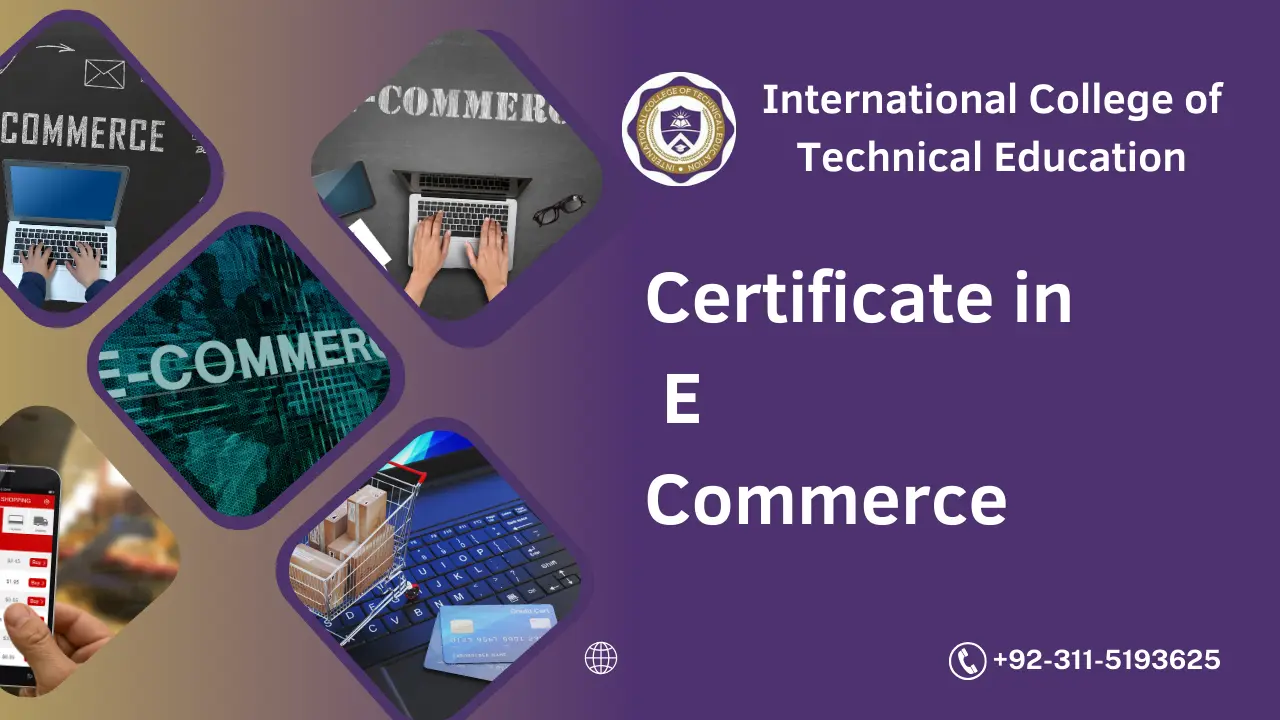In the digital age, e-commerce has revolutionized the way businesses operate and consumers shop, offering unprecedented convenience, accessibility, and opportunities for growth. Whether you’re an entrepreneur looking to launch an online store or a professional seeking to advance your career in the e-commerce industry, a Certificate in E-Commerce provides essential knowledge and skills to thrive in this dynamic landscape. This comprehensive guide will delve into the core components of this certification, from its foundational principles to the promising career prospects it unlocks.
Diploma in E Commerce
The Certificate in E-Commerce is a specialized program designed to equip individuals with the essential skills and knowledge needed to succeed in the rapidly evolving world of online business. From understanding e-commerce platforms to implementing digital marketing strategies, this course provides a comprehensive foundation for navigating the complexities of the e-commerce ecosystem and driving success in online retail.
Course Benefits
Enrolling in a Certificate in E-Commerce program offers numerous benefits, including:
- Comprehensive Understanding: Gain a comprehensive understanding of the e-commerce landscape, including market trends, business models, technologies, and regulations.
- Practical Skills Development: Develop practical skills in e-commerce platform management, website development, digital marketing, customer relationship management, and data analytics.
- Industry-Relevant Curriculum: Learn from industry experts and practitioners, with a curriculum tailored to address the latest trends, challenges, and opportunities in e-commerce.
- Business Growth Opportunities: Unlock opportunities for business growth and expansion by leveraging the power of e-commerce to reach new markets, attract customers, and increase sales.
- Entrepreneurial Empowerment: Empower entrepreneurs and small business owners to launch and grow successful e-commerce ventures, from setting up an online store to managing operations and scaling their business.
- Career Advancement: Advance your career in the e-commerce industry by acquiring specialized skills and knowledge that are in high demand among employers and businesses.
- Flexibility and Convenience: Enjoy the flexibility and convenience of online learning, with self-paced courses that can be completed from anywhere with an internet connection.
Study Units
The Certificate in E-Commerce curriculum typically includes the following study units:
- Introduction to E-Commerce: Explore the fundamentals of e-commerce, including its history, evolution, business models, and key players in the industry.
- E-Commerce Platforms and Technologies: Learn about popular e-commerce platforms such as Shopify, WooCommerce, Magento, and BigCommerce, and understand their features, capabilities, and customization options.
- Website Development: Develop essential skills in website development and design, including HTML, CSS, and responsive web design principles, to create user-friendly and visually appealing e-commerce websites.
- Digital Marketing Strategies: Explore digital marketing strategies tailored for e-commerce, including search engine optimization (SEO), pay-per-click (PPC) advertising, email marketing, social media marketing, and content marketing.
- Customer Relationship Management (CRM): Understand the importance of customer relationship management in e-commerce, including customer segmentation, relationship building, retention strategies, and customer service best practices.
- E-Commerce Analytics: Learn how to analyze e-commerce data effectively using tools such as Google Analytics, to track website traffic, measure conversion rates, and make data-driven decisions to optimize e-commerce performance.
- Payment Processing and Security: Explore payment processing options, including payment gateways, merchant accounts, and PCI compliance, to ensure secure transactions and protect customer data.
- Legal and Regulatory Considerations: Understand the legal and regulatory landscape of e-commerce, including consumer protection laws, privacy regulations, and compliance requirements for online businesses.
Learning Outcomes
Upon completing the Certificate in E-Commerce, students can expect to achieve the following learning outcomes:
- E-Commerce Expertise: Demonstrate expertise in e-commerce fundamentals, platforms, technologies, and best practices, enabling you to effectively launch, manage, and grow online businesses.
- Practical Skills: Develop practical skills in website development, digital marketing, customer relationship management, data analytics, and payment processing, essential for success in e-commerce.
- Business Growth Strategies: Implement effective strategies for business growth and expansion in the e-commerce industry, including attracting customers, increasing sales, and maximizing profits.
- Data-Driven Decision Making: Use e-commerce analytics to analyze data, identify trends, measure performance, and make informed decisions to optimize e-commerce operations and achieve business goals.
- Customer Satisfaction and Loyalty: Build strong customer relationships, provide exceptional customer service, and implement retention strategies to enhance customer satisfaction and loyalty.
- Legal and Regulatory Compliance: Ensure compliance with legal and regulatory requirements for e-commerce businesses, protecting both customers and the business from potential risks and liabilities.
Who is This Course For
The Certificate in E-Commerce is ideal for:
- Entrepreneurs and Small Business Owners: Individuals looking to launch or grow their online businesses and leverage the power of e-commerce to reach new markets and increase sales.
- Marketing and Sales Professionals: Marketing and sales professionals seeking
Future Progression
Graduates of the Certificate in E-Commerce may choose to pursue advanced specializations or certifications in specific areas of e-commerce, such as digital marketing, e-commerce analytics, user experience (UX) design, or e-commerce platform development. These advanced credentials can deepen expertise and provide a competitive edge in the job market, enabling professionals to take on leadership roles or specialize in niche areas of e-commerce.
The e-commerce landscape is constantly evolving, with new technologies, platforms, and strategies emerging regularly. Graduates of the Certificate in E-Commerce are encouraged to engage in continuous learning and professional development to stay abreast of industry trends and maintain their competitive edge. This may involve attending workshops, seminars, or conferences, enrolling in online courses, or joining professional associations dedicated to e-commerce and digital marketing. By staying informed and continuously updating their skills, graduates can adapt to changes in the e-commerce landscape and seize new opportunities for growth and success.






